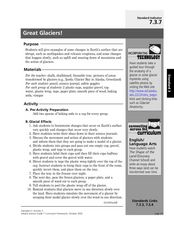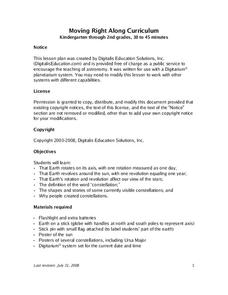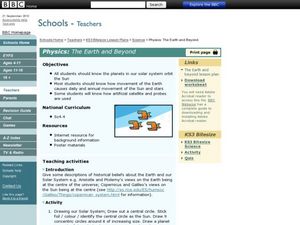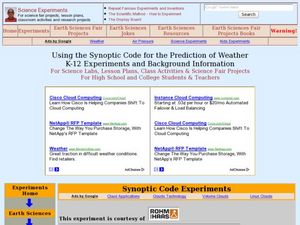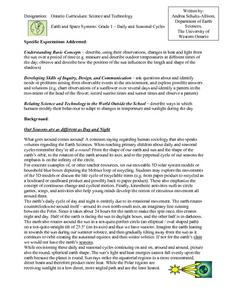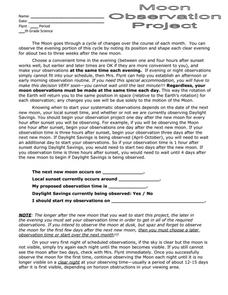Curated OER
The Inner Planets
In this planets worksheet, students review the characteristics of the inner planets: Mars, Venus, Earth, and Mercury. This worksheet has 15 multiple choice questions.
Curated OER
Great Glaciers!
Seventh graders study the earths surface and how changes happen to it. In this glacier instructional activity students complete a lab activity to see how glaciers form.
Curated OER
Seasons
Students investigate the reason for seasons on Earth during three activities. They construct a model of the Earth and Sun to identify patterns in the changes of the angle of light on the Earth's surface. Then they conduct a heat...
Curated OER
It's A Meteor
Students complete a webquest to find Earth's relationship to the sun. In this webquest lesson plan, students complete tasks to understand the effect of the sun on weather and time. Students create a multimedia presentation as...
Curated OER
Water Works Wonders
Students examine where water is found in the world, how we use it, and the various forms it takes. They observe the refraction of light through a prism, record the day and night sky over a week's time, and create a topographic model of...
Curated OER
Understanding the Compass
Young geographers view an excellent description of how compasses work, then work in partners to make a compass of their own. There is a heavy religious component in this lesson; for example, as closure, the teacher reads a verse from the...
Curated OER
Exploring the Night Sky: Fall/Winter
Students explain how moon phases occur. They explain three ways that the night sky has been used through history. Students locate some of the constellations in the night sky. They discuss stories and myths surrounding stars.
Curated OER
Earth's Rotation
Students explore the Earth and its rotation. Volunteers model the sun-Earth system to demonstrate that the Earth rotates around the sun. In groups, students simulate "traveling" around the sun and discuss when it is night and day.
Curated OER
Physics The Earth and Beyond
Fourth graders will explore our solar system. In this physics lesson students create a model of the solar system to explore the movement of Earth, the Sun, and stars.
American Museum of Natural History
Journey to the Stars
Fifteen detailed pictures and informative captions delve deep into the exploration of stars—their life cycle and importance in the universe.
Curated OER
Timekeeping by the Sun
Students measure shadows to learn about the Sun-Earth relationship. In this astronomy lesson, students create a shadow stick of a Pokemon character and record measurements of its shadow in a data chart. Follow-up discussions guide...
Curated OER
Our Sun and the Four Seasons
Students discover the relationship between the sun and Earth. In this weather lesson, students examine the effect of the sun on the Earth's seasons. Students complete a weather activity using props to simulate the sun and...
Curated OER
Using the Synoptic Code for the Prediction of Water
Learners construct a thermoscreen for the experiment. In this earth science lesson, students make observations and interpret them using synoptic codes. They predict the weather based on gathered information.
Curated OER
The Sun, Moon, and Our Solar System: Teacher/Student Notes
Introduce basic Earth and space science to your budding astronauts. This handout works in two ways, the first part provides information about the sun, moon, eclipses, and Earth to be read to or by the class. The second part is composed...
Curated OER
Science: Daily and Seasonal Cycles
First graders use their observations to describe daily and seasonal cycles. through a demonstration using a suspended ball and flashlight, they determine the time of day in various locations. Next, 1st graders participate in a...
Weber State University
The Sun and the Seasons
Why is there more daylight in June than in December if you live above the equator? How does the angle of sunlight shift throughout the year? Answer these questions and more with an interactive article about the sun, its path through the...
Curated OER
The Solar System
Students describe the different bodies that make up our solar system, explain the place of our solar system within the Milky Way Galaxy and the universe, explain day and night and the Earth's movement, and describe the relationship...
Curated OER
Shadow Trackers: From Photography to Writing
Students explore the rotation of the earth. In this science instructional activity, students view photos of various places around the world. Students conduct an experiment in which they can see how the earth's rotation creates shadows on...
University of Texas
Observing the Moon
Why does it look like there is a man on the moon? Why does the moon look different every night? These are the focus questions of a lesson that prompts class members to observe and record the nightly changes of Earth's natural...
Curated OER
Comprehension: Compare and Contrast Topics in Two Texts
A scripted lesson can be a big help for new teachers. This fully scripted three-day learning activity provides teachers with the means to demonstrate how to compare and contrast two topics in two texts. Learners will work as a class to...
School World
Moon Observation Project
Mrs. Flynt has designed a 12-day moon observation activity that is best assigned when daylight hours are shorter. Middle school moon experts record several factors, including the altitude above the horizon, the azimuth, the phase, and...
K5 Learning
Landforms
Valleys, mountains, and plateaus are just a few geographic landforms on our Earth. Read about these types and more in a brief landform passage. After reading, learners respond to six short answer comprehension questions.
Curated OER
Making Clouds: Aerosol-Cloud Interactions in a Beaker
Students observe a teacher demo on how clouds form. In this earth science lesson, students discover how cloudiness affects relative humidity. They explain the scattering of light by clouds.



